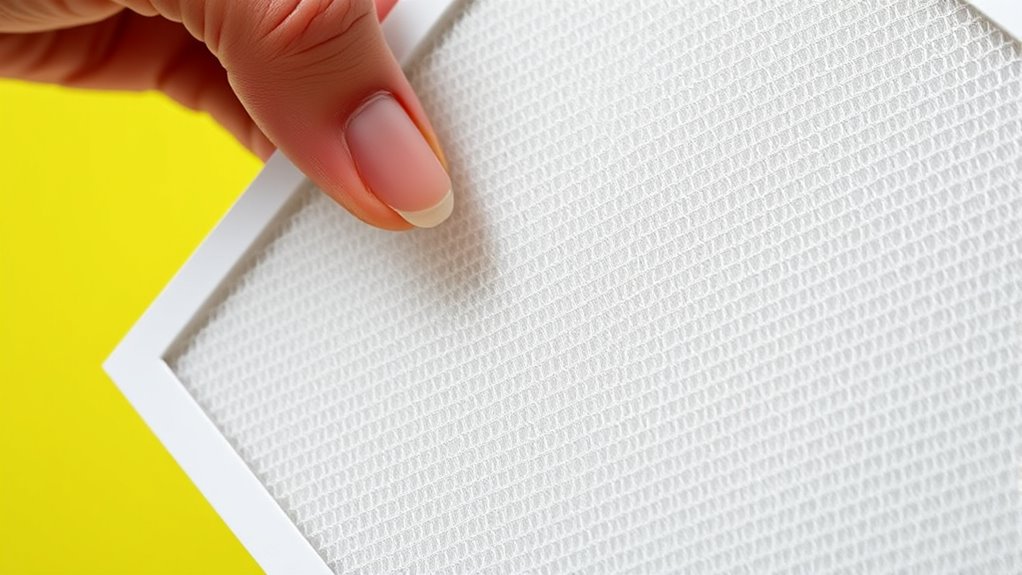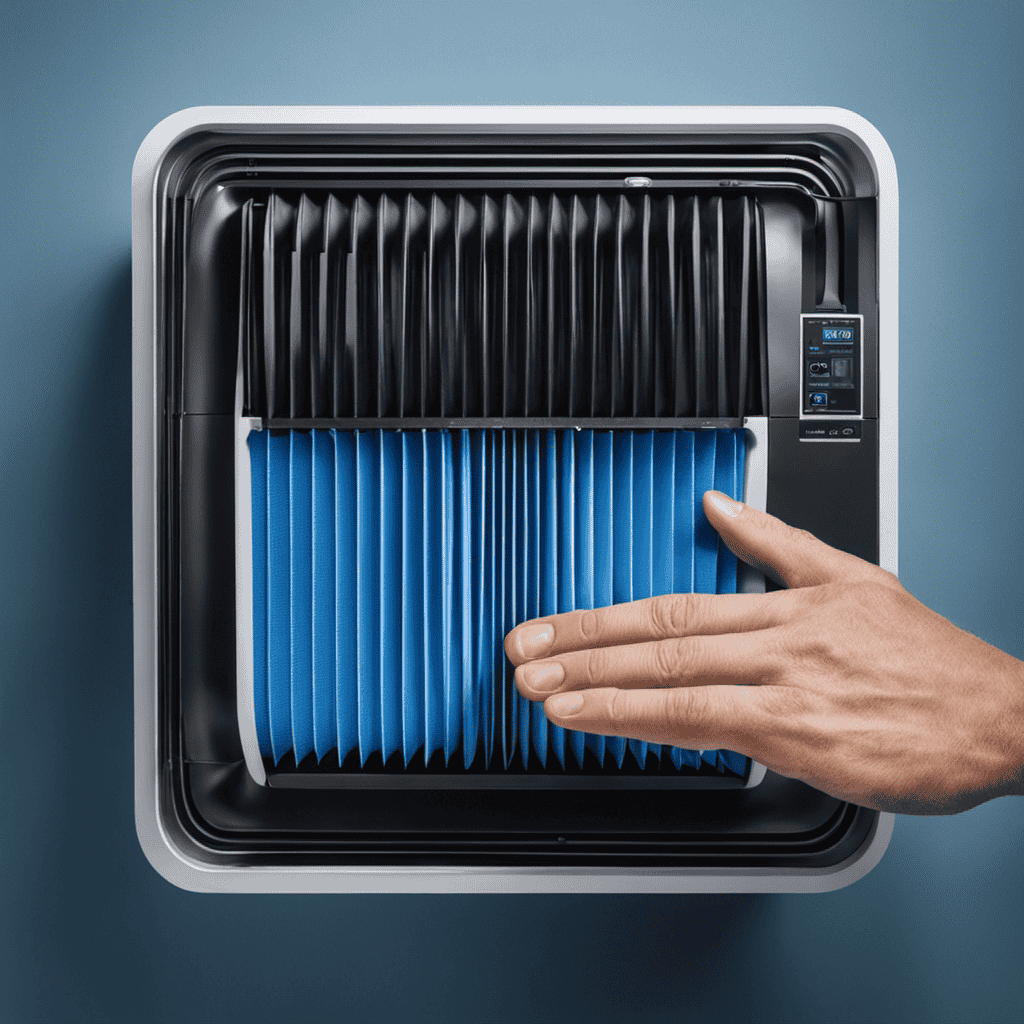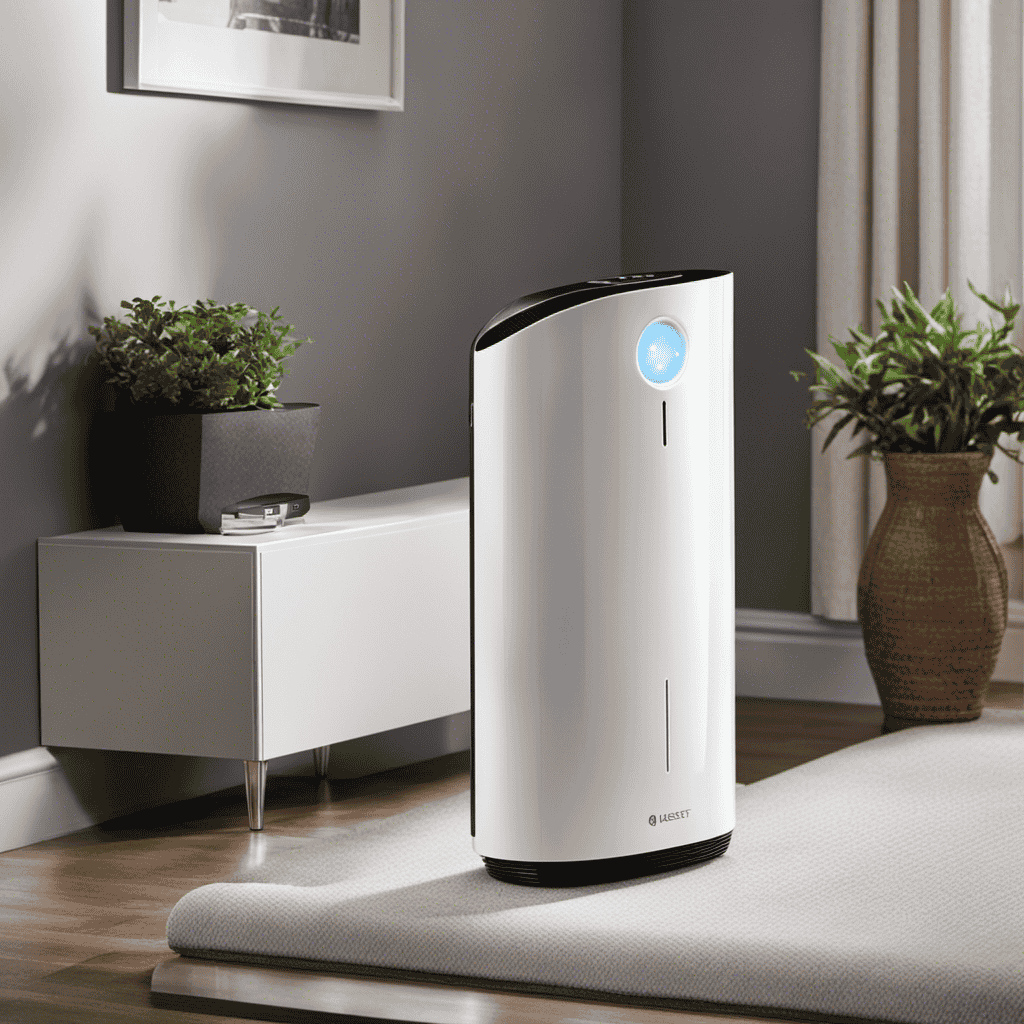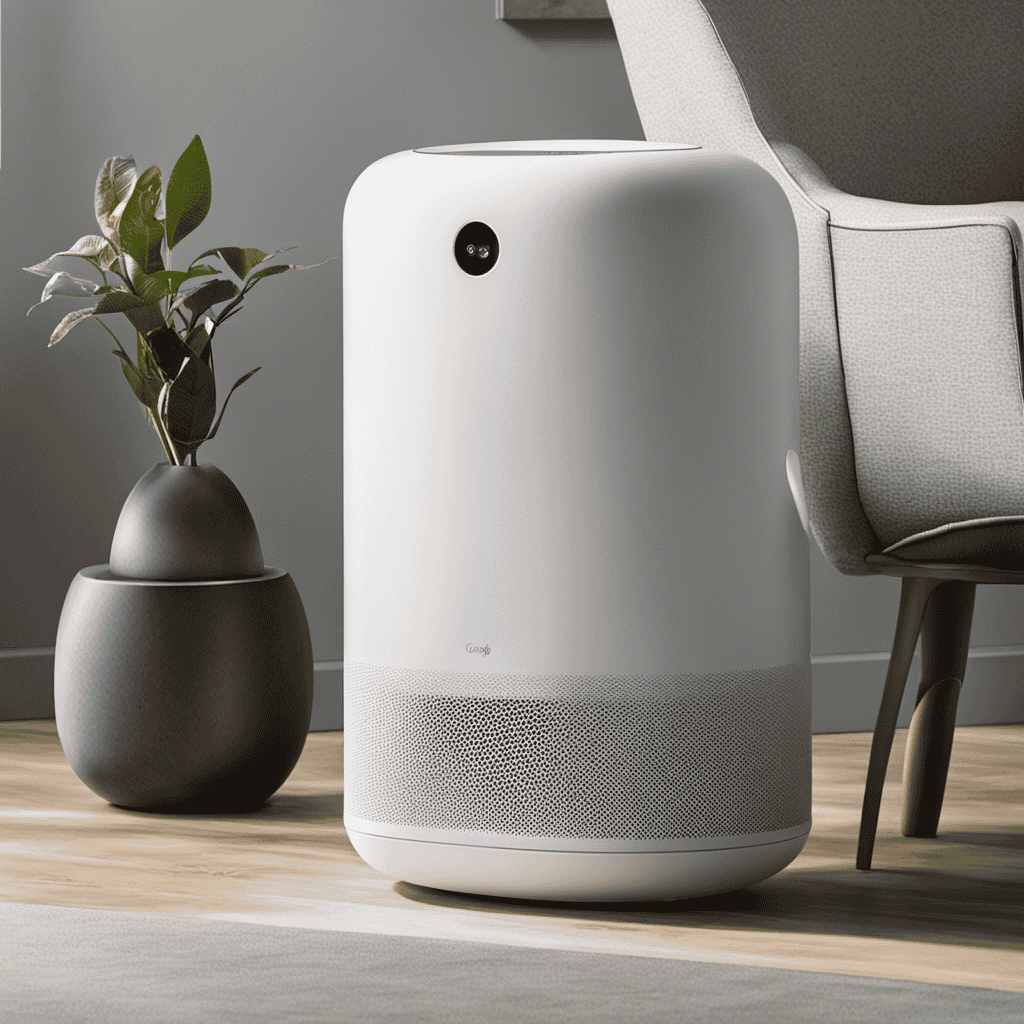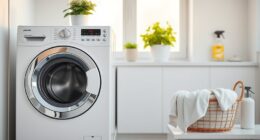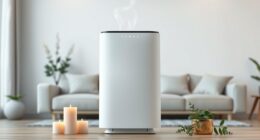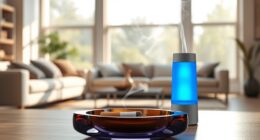You typically can’t wash and reuse a HEPA filter because most are designed for single use, and cleaning can damage their delicate fibers, reducing effectiveness. Washing may cause tears or shape loss, which lets particles bypass the filter. While some filters might tolerate gentle cleaning, it’s generally safer to replace them when needed. If you’re curious about proper maintenance techniques and how to tell when it’s time to swap your filter, there’s more helpful information to explore.
Key Takeaways
- Many HEPA filters are not designed to be washed; washing can damage the delicate filtration media.
- Some filters, like electrostatic types, may be vacuumed or cleaned gently, but always follow manufacturer instructions.
- Washing HEPA filters often reduces their efficiency and shortens their lifespan, making replacement preferable.
- Proper cleaning involves gentle brushing and air drying; avoid harsh soaps or high-pressure water.
- Regular inspection and timely replacement are recommended over washing for maintaining air quality.
Understanding HEPA Filters and Their Functions
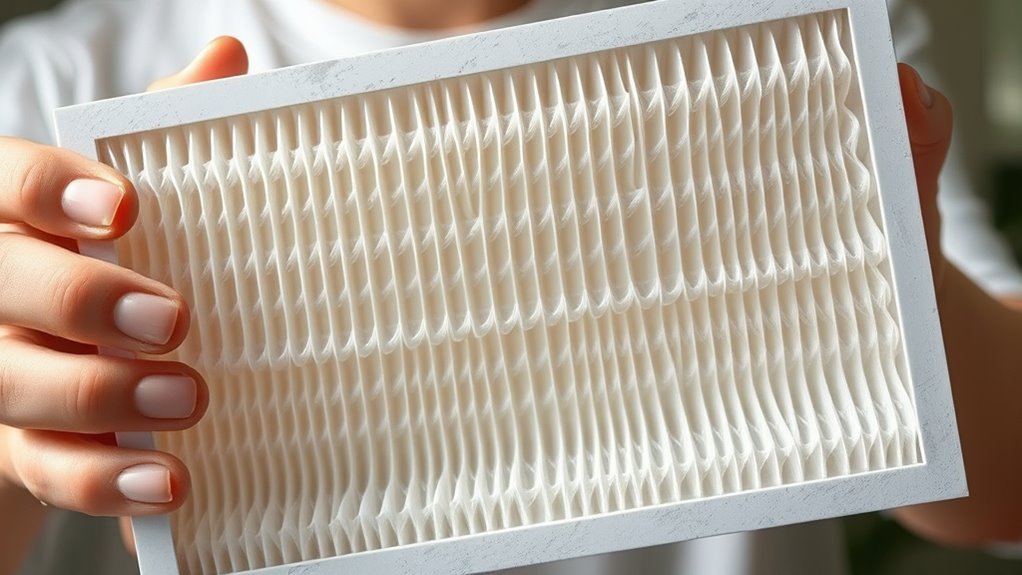
HEPA filters are highly efficient air filters designed to capture tiny particles, including dust, pollen, pet dander, and airborne bacteria. Understanding how these filters work is key to proper air purifier maintenance and extending their filter lifespan. HEPA filters trap particles through a dense web of fibers, forcing air through a fine mesh that captures contaminants. Unlike other filters, HEPA units don’t just trap dust—they remove allergens and microbes, improving indoor air quality. To keep your purifier functioning at its best, regular maintenance is essential, which includes monitoring filter condition and replacing or cleaning it as needed. Proper care not only ensures the filter continues to perform effectively but also helps prolong its lifespan, saving you money and maintaining cleaner, healthier air in your home. Additionally, understanding the filter replacement process can help ensure optimal performance and air quality. Regular inspection of filters can prevent clogging and reduce strain on the unit, ultimately enhancing overall efficiency. Maintaining clean filters also prevents the buildup of harmful pollutants, ensuring your air purifier works effectively over time. Being aware of filter lifespan guidelines can help you plan timely replacements and avoid unexpected declines in air quality. Moreover, staying informed about AI safety measures can contribute to developing better technologies for air purification and other environmental controls.
Types of HEPA Filters and Their Cleaning Capabilities
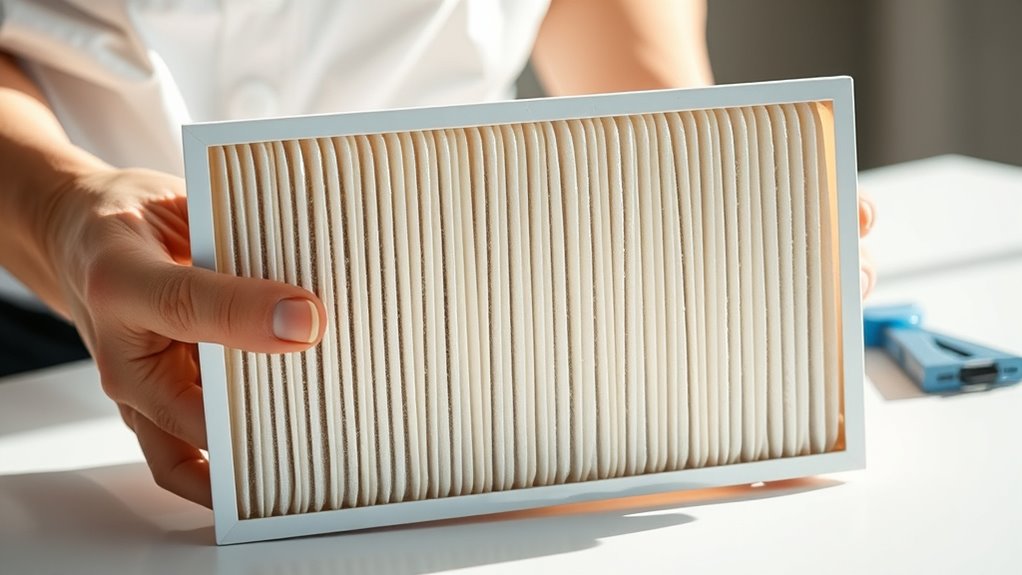
There are several types of HEPA filters, each with different cleaning and maintenance capabilities. HEPA filter types include true HEPA filters, which capture 99.97% of particles, and HEPA-like or HEPA-type filters, which have slightly different efficiency levels. Some filters are designed for single-use, while others may tolerate cleaning methods like gentle vacuuming or compressed air. However, not all HEPA filters can be safely cleaned or reused without damaging their structure. For example, true HEPA filters generally aren’t washable because cleaning can compromise their filtration media. It’s essential to understand the specific cleaning methods suitable for your filter type to avoid reducing its effectiveness. Proper knowledge of HEPA filter types helps you determine whether cleaning or replacement is the best approach. Additionally, understanding the filtration media used in your filter can help assess its durability and cleaning options. Knowing the filter construction can also influence whether a filter is reusable or needs replacement. Some advanced HEPA filters incorporate durable materials designed to withstand light cleaning, but always consult manufacturer guidelines before attempting any cleaning.
Risks Associated With Washing HEPA Filters
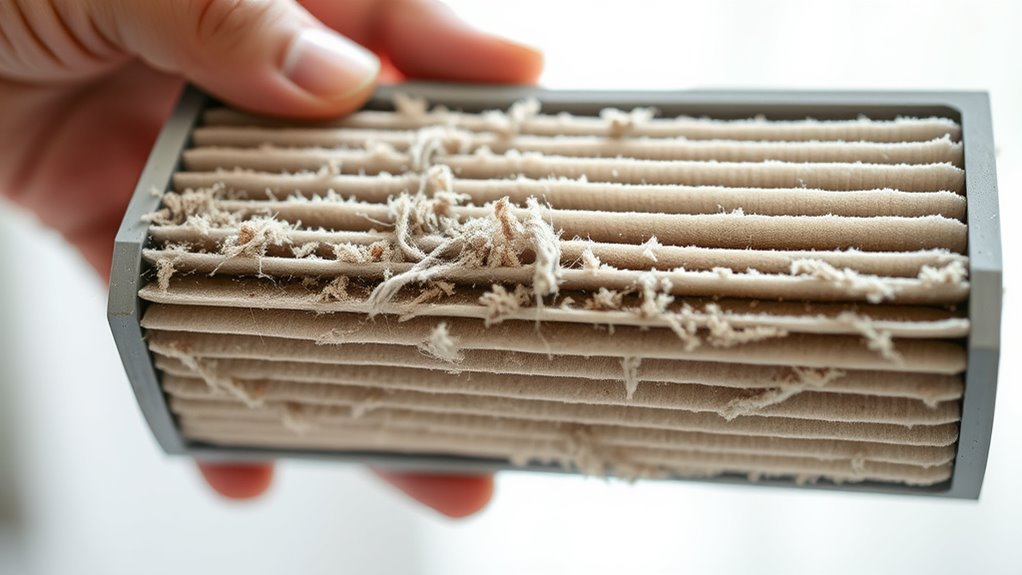
Washing HEPA filters poses significant risks because it can easily damage the delicate filtration media. If the filter material isn’t handled carefully, tiny fibers can tear or become misshapen, reducing effectiveness. Overly aggressive cleaning or too frequent washing can compromise the filter’s integrity. Imagine:
- The fragile fibers unraveling under water pressure.
- Creases forming that trap dirt and hinder airflow.
- The filter material losing its shape after improper handling.
- Residual moisture leading to mold growth.
Additionally, the integration of neural networks in AI tech emphasizes the importance of maintaining proper data processing methods, which parallels the need for careful handling of delicate materials like HEPA filters to ensure optimal performance. Proper knowledge of filter maintenance can help prevent damage and ensure your air purifier continues to operate effectively. Moreover, understanding the material properties of HEPA filters can guide appropriate handling and cleaning methods, reducing the risk of damage. These risks highlight why understanding the proper cleaning frequency is essential. Washing too often or using harsh methods can ruin the filter altogether. Protect your investment by recognizing that washing may do more harm than good, especially without proper technique. Regularly monitoring air quality can help you determine if your filter needs cleaning, avoiding unnecessary damage.
How to Determine if Your HEPA Filter Can Be Washed
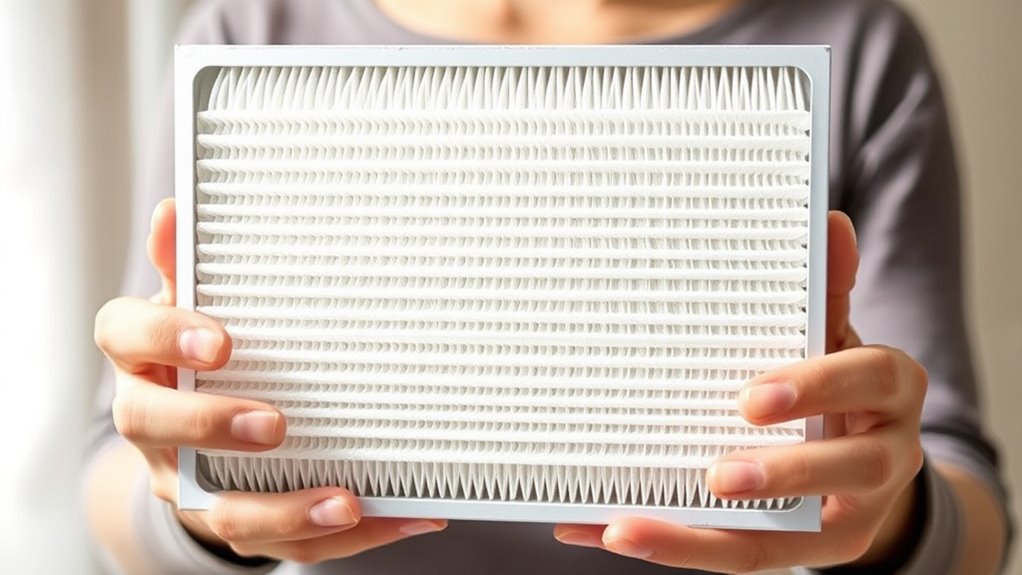
Before you decide to clean your filter, it’s important to verify whether it’s suitable for washing. Check the manufacturer’s instructions or labels on the filter—many HEPA filters are not designed to be washed and may be damaged if you try. Consider the filter’s lifespan; if it’s nearing the end, washing might not be worthwhile. Additionally, evaluate how often you should clean your filter; frequent washing can reduce its effectiveness over time, especially if the filter isn’t meant for reuse. Some filters are labeled as washable or reusable, but others are disposable. Confirming these details helps prevent unnecessary damage and ensures you don’t compromise your air quality. Always follow the manufacturer’s guidelines to determine if washing is a viable option. Proper filter maintenance is essential for maintaining optimal air purifier performance and ensuring healthy indoor air quality. Moreover, understanding the filter type can guide you in making the best cleaning decisions and prolonging its functionality. Being aware of filter care instructions can also help you extend the life of your filter and maintain its filtration efficiency. Additionally, knowing the self-watering plant pots concept can serve as an analogy for understanding how filters work to trap particles effectively.
Proper Methods for Cleaning Different Types of HEPA Filters
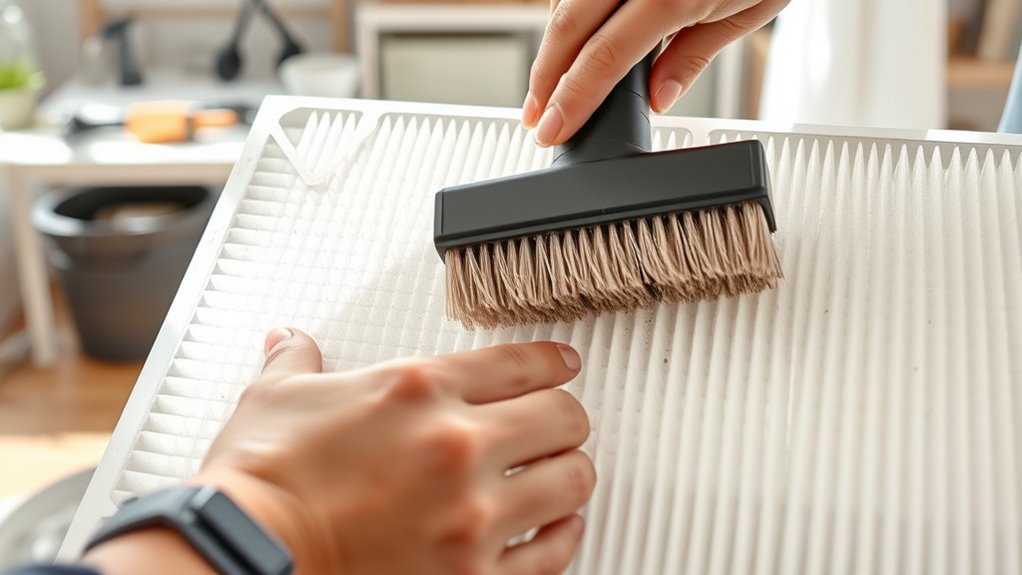
Different HEPA filters require specific cleaning methods to stay effective. You need to know how to properly wash reusable filters, fiberglass models, and electrostatic types. Incorporating knowledge about filter maintenance can further extend the lifespan and performance of your HEPA filters. For example, understanding air purifier technology can help you select the best cleaning practices for each filter type. Additionally, being aware of filter lifespan can guide you in determining when replacement is necessary to maintain optimal air quality. Regularly inspecting your filters and understanding their specific component materials can also aid in choosing the most appropriate cleaning techniques to prevent damage.
Reusable HEPA Filter Cleaning
Properly cleaning reusable HEPA filters depends on the filter type and manufacturer instructions. To maintain ideal air purifier performance and maximize filter lifespan, follow these steps:
- Gently vacuum the filter with a soft brush attachment to remove dust.
- Rinse with cold water, avoiding harsh soaps or chemicals.
- Shake off excess water and let the filter air dry completely—preferably in a well-ventilated area.
- Reinstall the dry filter carefully, ensuring it fits snugly.
- Regular maintenance and proper cleaning can help prevent remote work burnout and ensure optimal air quality. Additionally, understanding filter material composition can help determine the best cleaning method for your specific HEPA filter. Being aware of manufacturer guidelines is also crucial to avoid damaging the filter during cleaning. Recognizing the filter lifespan can help you plan timely replacements to maintain air quality effectively.
Washing Methods for Fiberglass
When cleaning fiberglass HEPA filters, employing gentle washing methods is vital to prevent damage and maintain filtration efficiency. Use lukewarm water and a soft brush or cloth to carefully remove dust and debris. Avoid harsh scrubbing or high-pressure water, which can tear or weaken the fiberglass media, reducing HEPA filter longevity. Focus on rinsing thoroughly to clear away dirt without damaging the fibers. Never use detergents or cleaning chemicals, as they can compromise the filter’s structure. Proper fiberglass cleaning preserves the filter’s integrity and guarantees maximum performance. Additionally, understanding the filter material helps in choosing appropriate cleaning methods to avoid unnecessary damage. Recognizing the filter type is crucial, as different filters may require specific care techniques. Proper handling during washing also helps extend the lifespan of fiberglass HEPA filters, making them more effective and cost-efficient over time. Incorporating knowledge about filter maintenance ensures that filters remain in optimal condition for longer periods. Being aware of the filter performance metrics can help you determine when a filter needs cleaning or replacement. This careful approach is key to maintaining your filter’s efficiency and durability.
Care for Electrostatic Filters
Electrostatic HEPA filters rely on static charges to trap airborne particles, making their cleaning approach distinct from fiberglass types. To maintain airflow enhancement, avoid abrasive cleaning methods that could weaken the static charge. Instead, follow these steps:
- Gently vacuum the surface with a soft brush attachment to remove surface dust.
- Use compressed air to blow out debris from the filter without damaging the electrostatic charge.
- Avoid washing with water or liquids, as moisture can diminish the filter’s effectiveness.
- When reinstalling, ensure proper filter installation to prevent gaps that compromise airflow.
Proper care keeps your electrostatic filter functioning efficiently. Regular cleaning extends its lifespan, but always handle with care to preserve the static charge and maintain optimal airflow.
Signs That Indicate a HEPA Filter Needs Replacement
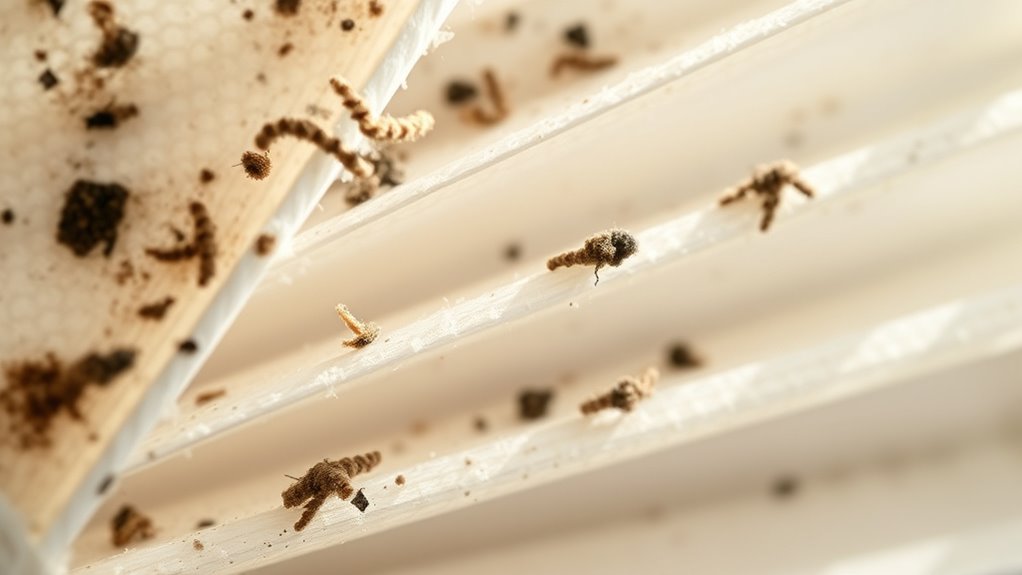
If your HEPA filter isn’t working as well as it used to, you might notice decreased filtration efficiency. Visible dirt or damage can also be clear signs that it’s time for a replacement. Additionally, if you detect unusual odors coming from your system, it could indicate the filter needs changing.
Reduced Filtration Efficiency
Have you noticed your HEPA filter isn’t capturing particles as effectively as it used to? That’s a sign your filter’s filtration efficiency has declined. Over time, the filter’s lifespan decreases, and cleaning frequency won’t restore its effectiveness. Here are some clues:
- Dust and allergens seem to linger longer in your space.
- Air feels less fresh after running your purifier.
- You notice more frequent sneezing or allergy symptoms.
- The filter appears visibly clogged or overly dirty.
When these signs appear, it’s time to contemplate replacing your HEPA filter. Relying on a filter past its prime means reduced filtration efficiency, risking indoor air quality. Regularly monitoring these indicators guarantees your filter functions at its best.
Visible Dirt or Damage
Noticing visible dirt or physical damage on your HEPA filter is a clear sign it needs replacing. Over time, dirt accumulation can obscure the filter’s surface, reducing its effectiveness and signaling that its filter lifespan has been reached. Physical tears, bent or broken frames, or collapsed pleats are signs of damage that compromise filtration. If you see debris trapped on the surface or notice discoloration, it indicates the filter has been used extensively and may no longer trap particles efficiently. Ignoring these signs can lead to decreased indoor air quality. Regularly inspecting your filter for visible dirt or damage ensures you replace it before it fails, maintaining superior filtration and healthy air quality in your space.
Unusual Odor Emission
Unusual odors emanating from your HEPA filter are a strong indication that it may need replacement. Over time, poor filter longevity can cause smells to escape, reducing odor control and signaling the filter’s decline. If you notice a persistent musty or chemical scent, it’s time to inspect your filter. Imagine opening your HVAC or air purifier and catching a whiff of:
- A stale, damp odor like mold or mildew
- A sharp chemical smell from trapped cleaning agents
- An earthy scent indicating trapped organic matter
- A sour or rotten aroma suggesting accumulated pollutants
These odors suggest your filter is no longer effectively trapping particles and may be releasing trapped odors back into your space. Replacing the filter ensures better odor control and maintains ideal filter longevity.
Alternative Options to Washing and Reusing HEPA Filters
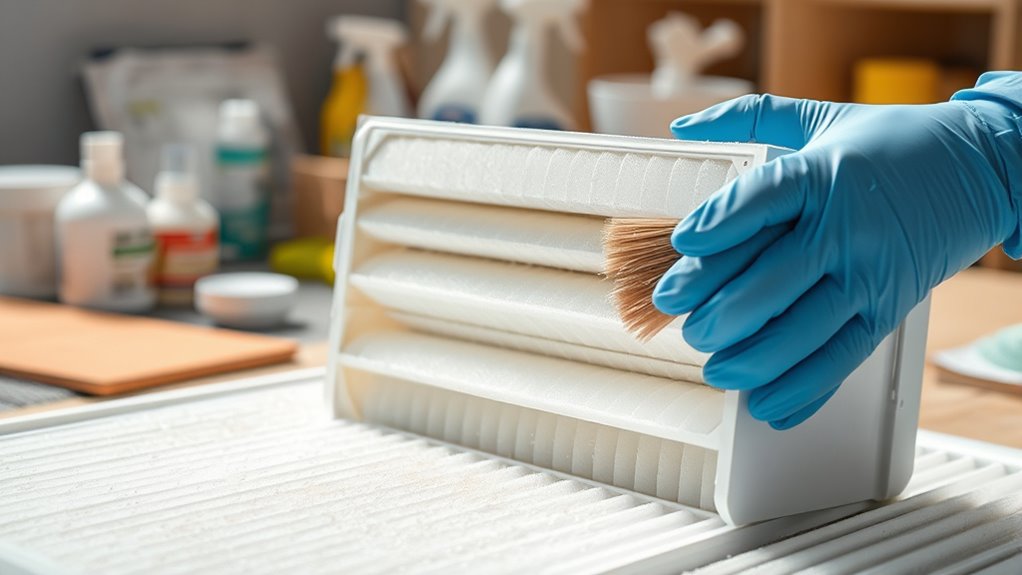
When washing and reusing HEPA filters isn’t practical or effective, there are alternative options you can consider to maintain clean air quality. One key approach is regular air purifier maintenance, including timely filter replacements. This ensures your device operates efficiently and prolongs the overall HEPA filter lifespan. Instead of attempting to clean a used filter, it’s often better to follow the manufacturer’s recommendations for replacement intervals. Using high-quality filters designed for your specific air purifier guarantees ideal filtration. Additionally, consider upgrading to filters with longer lifespans or those that are easier to replace. Proper maintenance not only preserves air quality but also saves you money in the long run by preventing the need for costly repairs or premature replacements.
Environmental and Cost Benefits of Reusing HEPA Filters
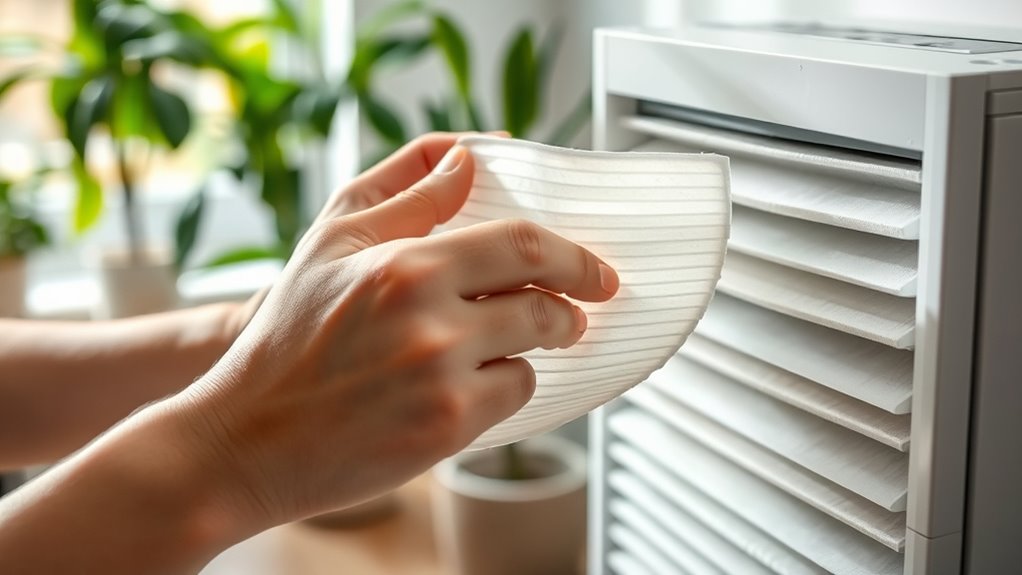
Reusing HEPA filters can considerably benefit both the environment and your wallet. By extending the filter’s lifespan, you reduce waste and the need for frequent filter disposal, lessening landfill burden. Think about the impact:
- Fewer filters ending up in trash dumps
- Less manufacturing energy used to produce new filters
- Cost savings from buying fewer replacements
- Reduced environmental footprint from less waste and resource use
Additionally, reusing filters means you can invest in regular air quality testing to ensure the filter remains effective. This proactive approach helps maintain ideal indoor air quality without the environmental cost of constant disposal. Overall, reusing HEPA filters supports sustainability and saves money while keeping your air clean.
Expert Recommendations for Maintaining HEPA Filter Effectiveness
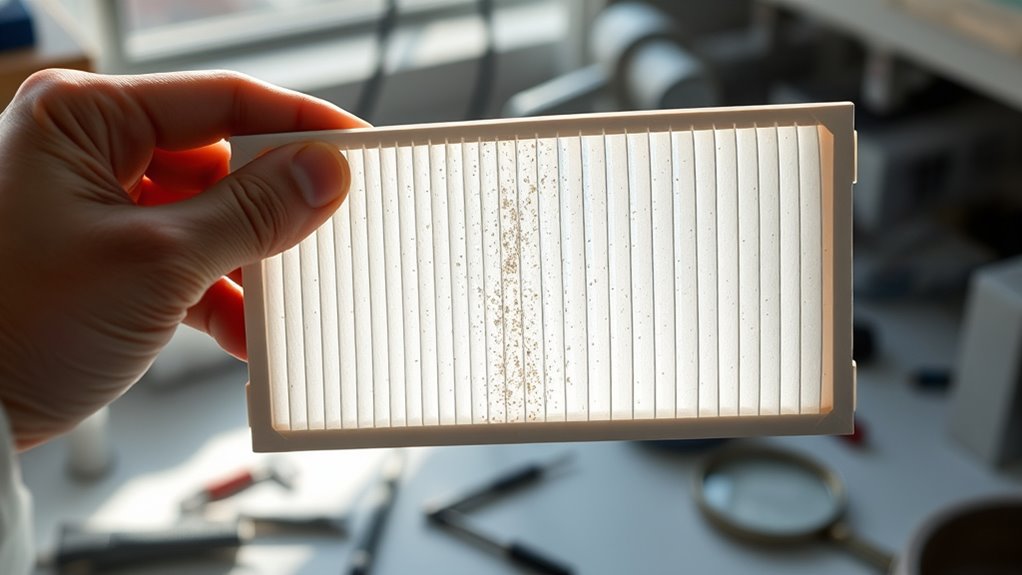
To guarantee your HEPA filters continue to perform effectively after reuse, it’s important to follow expert recommendations for maintenance. Regularly inspecting your filter helps ensure it’s free of damage or excessive dirt, which can compromise air quality. If you choose to clean your filter, do so carefully according to manufacturer instructions, as improper cleaning can reduce its filter lifespan. Keep in mind that washing or attempting to reuse HEPA filters may not restore their original filtration efficiency, and over time, their ability to improve air quality diminishes. For ideal air quality, consider replacing filters when they show signs of wear or after the recommended lifespan. Following these maintenance guidelines helps you get the most out of your HEPA filter’s performance and longevity.
Frequently Asked Questions
How Long Can a HEPA Filter Be Safely Reused After Washing?
You wonder how long you can safely reuse a HEPA filter after washing. Typically, the filter’s lifespan depends on washing frequency and the type of filter. Most HEPA filters aren’t designed for washing; doing so can damage the media and reduce efficiency. Generally, you should replace your HEPA filter every 6 to 12 months, rather than washing it repeatedly, to guarantee ideal air quality and filter performance.
Do All HEPA Filters Have a Washable Design?
You might think all HEPA filters are washable, but that’s not true. Most HEPA filters aren’t designed for cleaning methods like washing, which can damage their filter lifespan. Instead, they trap particles effectively until they need replacement. Always check the manufacturer’s instructions before attempting to clean or reuse a filter. Typically, filters are meant to be replaced rather than washed, ensuring peak performance and indoor air quality.
Will Washing a HEPA Filter Compromise Its Filtration Efficiency?
Washing a HEPA filter can definitely compromise its filtration efficiency, as the filter material is delicate. Using improper cleaning methods may damage the fibers, reducing its ability to trap tiny particles. It’s best to avoid washing unless the manufacturer explicitly states the filter is washable. Instead, consider replacing the filter regularly to guarantee ideal air quality and maintain the filter’s effectiveness in capturing pollutants.
Are There Specific Cleaning Agents Recommended for HEPA Filter Maintenance?
For filter cleaning, you shouldn’t use any cleaning agents on HEPA filters, as they’re not chemical compatible. Using chemicals can damage the filter media, reducing its efficiency. Instead, you should gently vacuum or tap the filter to remove dust. Always check the manufacturer’s guidelines for proper maintenance, and avoid harsh chemicals to guarantee your HEPA filter stays effective and lasts longer.
How Does Washing a HEPA Filter Affect Indoor Air Quality?
Washing a HEPA filter can considerably impact indoor air quality by potentially releasing airborne particles back into your space if not done properly. It may also shorten the filter’s lifespan, making it less effective at trapping pollutants. You might think cleaning extends its use, but improper washing can compromise its filtration ability, allowing more airborne particles to circulate and reducing overall air quality in your home.
Conclusion
In the world of air purification, your HEPA filter is like a loyal guardian guarding your home. Washing it might seem tempting, but it’s often like trying to revive a worn-out soldier—sometimes, replacement is the only way to guarantee top performance. By understanding your filter’s limits and choosing the right maintenance, you keep the air clean and your health protected. Think of it as tending a delicate garden—care and knowledge help it flourish.
